- Home
- Sharyn McCrumb
The Windsor Knot Page 6
The Windsor Knot Read online
Page 6
“Come in!” called Dr. Chandler, scrambling to get to his desk. Unfortunately, his manuscript was buried under an avalanche of cat, so he endeavored to look busy with a yellow legal pad.
“Robert, I thought you might like some coffee,” said his wife, appearing in the doorway with two cups and a plate of cookies on a newly polished silver tray. The tray and the fact that the cups were from a set of antique Bavarian china, usually kept in the bow-fronted display cabinet, were other signs of the rampant formality occasioned by the wedding. “I see you plan to join me, dear,” said Dr. Chandler, eyeing the second coffee cup. “How thoughtful.”
The invasion having been accomplished with the utmost civility, Amanda set the tray on the glass-topped table and settled into the chesterfield chair with the air of one who is about to preside at a meeting. “How is your chapter coming?” she asked, handing him the plate of cookies.
“Oh, tolerably,” he replied, glancing nervously at the cat. “It’s painstaking work, you know.”
“No. I cannot think why anyone would want to write a book. It pays very little and people only seem to read them in order to express unkind opinions about them.” She shrugged. “Really, why bother? But you go right ahead with your little hobby. I just wanted to tell you how things were progressing with the wedding.”
“Elizabeth isn’t even here yet,” he grumbled, thinking it only fair that the blushing bride should share in the general inconvenience.
“No, but that hardly matters, does it? Brides are a nuisance, anyway. They always come up with the most unsuitable ideas and often one has to be quite firm with them.”
“Why shouldn’t she have some say-so, Amanda? It’s her wedding!”
Amanda laughed. “Really, Robert, you might as well ask the cow how it wants the roast cooked. Elizabeth will be wise to leave everything to me, as I have a great deal of experience in social matters. She did phone to ask about locating one of her old school friends from high school. Wants her for a bridesmaid.”
“And were you able to assist her?”
“Oh, yes. She certainly isn’t hard to find.” Amanda paused for effect. “It’s Jenny Ramsay.”
Dr. Chandler thought hard. “That name sounds familiar. Have we met her?”
“Every day for four years, Robert. She’s the weather girl on Channel Four.”
“Oh! Jenny. The perky little blonde who does the parades and things.”
“Exactly. Elizabeth hasn’t seen her since high school, but apparently they’d made some sort of teenage promise to be bridesmaids at each other’s wedding. I told you brides were dangerous.”
“She’ll look quite nice as a bridesmaid.”
“Certainly she will.” Amanda looked as if she wanted to add something, but apparently she thought better of it. “Oh, well!” she said with a little laugh. “Where was I? Oh, yes. I have made an appointment with Country Garden in Chandler Grove so that we can talk about the flowers-Elizabeth will be able to contribute to that discussion. And I have spoken to Mr. Compton at the community college about handling the photography. Now the caterers pose a bit of a problem. Lucy Bedford is on vacation this month and I had counted on using her. However, Charles recommended a new group in town. He has spoken to them and they are coming out tomorrow, so perhaps it will be all right.” Pushing her reading glasses back on the top of her head, she took an appraising look at her husband. “I’ll need to take a look at you in your black suit, dear. I did think that morning coats might be nice, but we can’t be sure of what the groom is planning to wear. Possibly a kilt.”
“He’s on his own, then.”
“He will have to be telephoned. I will delegate that to Elizabeth. Now, is there anything else I’ve forgotten?”
“Are you sure this is all right with Doug and Margaret? She’s their only daughter, you know.”
Amanda looked thoughtful. “I imagine it’s a great relief, really. You know that Margaret’s idea of formal entertaining is two tables of bridge. Besides, I think they may see it as a kindness.”
“How’s that?”
“Because we lost our little girl just before her wedding.” To her husband’s surprise, the brisk efficiency dissolved into the faltering voice of one trying very hard to overcome great obstacles.
Dr. Chandler kissed his wife’s cheek. “If there’s anything I can do, Amanda, just let me know.”
She patted his hand. “Thank you, Robert. I am managing well enough right now. You go back to your cowboy book.” With that she picked up the tray and was gone.
CHAPTER 6
ELIZABETH LOOKED AT the collection of mismatched and battered luggage heaped on the pavement beside her car. Each suitcase and totebag bore an identifying label (Cosmetics; Shoes; Stationery) so that she could find the items she had flung inside in the little time she’d had to pack.
“If I were organized, I would be taking only half this much,” she mused. As it was, she had thrown everything into the baggage, just to make sure that she wasn’t missing anything that would later turn out to be vital. She would have a difficult time fitting the untidy mound into her little car.
Elizabeth’s one point of satisfaction in seeing the mismatched heap was its striking resemblance to a pile of luggage pictured in one of her ubiquitous books on the royal family (they were now stashed in a black canvas suitcase labeled Books on Royal Family). Someone had photographed the Queen’s baggage at dockside, waiting to be loaded onto the royal yacht Britannia; there was a jumble of leather suitcases, cardboard boxes, green canvas bags, British Airways totebags, and black trunks, all bearing the yellow tag indicating that the items belong to Her Majesty.
When she discovered the picture, Elizabeth had been surprised at how plebeian the royal luggage looked. Surely the Queen-by all accounts the richest woman in the world-ought to be able to afford better travel receptacles than that! She should have a set of handmade leather luggage. Twenty matching pieces-forty! It made you wonder about expressions like fit for a queen! At least Her Majesty never had to carry any of the bags herself. That is where she and I differ, thought Elizabeth, hoisting a quilted garment bag into the back seat.
It was going to be a long drive. In order to reach Chandler Grove, located in the northernmost tip of Georgia, a traveler from southwest Virginia could either take Interstate 77 through the North Carolina piedmont to Charlotte-three hours of mindless driving-or one could follow the Blue Ridge Parkway, a rambling scenic route through the heart of the mountains, which took longer than the Lewis and Clark expedition. Elizabeth decided to take the dull but direct route. There would be enough scenic country roads after Charlotte, where anyone bound for Chandler Grove had to veer to the right and scoot across the South Carolina hills to pick up Highway 441 in Georgia. There, a succession of increasingly smaller country lanes led at last to Long Meadow Farm. The whole trip took about six hours, during which time Elizabeth planned to reflect further on her organization schemes for the wedding.
I expect I’m being very silly, thought Elizabeth. Probably some sort of genetic madness left over from the days when it mattered whether you got married or not But it’s my wedding, so whose business is it how manic I get?
She had spent the past few days devouring volumes on wedding etiquette, wedding folk customs, and royal weddings, soaking up the details as if she were going to be tested on the material. Now she was almost as much of an authority on the subject as Aunt Amanda. “And probably equally tiresome,” she said aloud. Elizabeth had no illusions about the glamour of romance; for nonroyal brides the fascination with matrimonial trivia did not extend beyond the bride’s most immediate circle. (This did not include the groom.) But she thought that perhaps women made a great ceremonial event out of a wedding in hopes that they would have to do it only once in their lives.
The volumes on royal weddings fascinated Elizabeth. She decided that she would not borrow any ideas from the weddings of Princess Margaret or Princess Anne, because their marriages had not worked out. “Of course I’m bein
g superstitious about it!” she told Jake Adair. “If you’re not superstitious, why get married at all?” To which Jake suggested that she go down the hall to cultural anthropology and give herself up as a research specimen.
Elizabeth had begun her wedding research by reading a good deal about the wedding of Prince Charles and Lady Diana Spencer. She was delighted to learn that her wedding date, July first, was also the birthday of Princess Diana, but she soon found that reading about the wedding was depressing in more ways than one. First of all, nobody’s wedding could bear comparison to that of the Prince of Wales, and in contrast it made even the most ambitious of efforts seem shoddy. What was Aunt Amanda’s oak-paneled drawing room compared to the splendor of St. Paul’s? And who cared whether your invitations were engraved or not, if theirs had been issued by the lord chamberlain on behalf of the Queen?
Once Elizabeth had got so caught up in her nuptial fantasies that she remarked aloud to Jake, “Would I love to get married in St. Paul’s Cathedral!”
Jake looked up from his Tony Hillerman novel and said, “Why? You don’t know anybody in Minnesota, do you?”
But there were drawbacks to the royal wedding that Elizabeth would not have to contend with. She comforted herself with those thoughts. No need of security guards. No government interference, forcing you to slight friends and distant relations in favor of foreign dignitaries. And nobody making the decisions for you about the reception food, the honeymoon, and all the other delightful details of planning the event. Face it, she told herself, Diana had very little say-so in that wedding.
Which brought her to the other depressing fact she had gleaned from her reading: by American standards the Princess of Wales was not even a high-school graduate. “That puts my Ph.D. in perspective,” Elizabeth had remarked. She would gladly give Diana any number of IQ points if she could also transfer to the princess a pound of weight per point.
Why couldn’t I be dumb and thin? she asked herself. Clearly, Princess Diana did not bear thinking about.
Thank God for Fergie.
The other royal wedding, that of Prince Andrew and Sarah Ferguson, had been much more to Elizabeth’s liking. Elizabeth couldn’t even daydream herself into the role of a svelte blonde ice princess marrying the heir apparent, but the plump and clever Duchess of York was a bride that she could identify with. She read the hastily published biographies of the newlyweds with considerable interest.
Sarah Ferguson was a full twenty-six when she married Prince Andrew. She had held a full-time job; she was definitely not a size five; and she’d had two past affairs that nobody troubled to deny. This was a far cry from the virginal teenage Princess of Wales; this was bordering on reality as Elizabeth knew it.
Elizabeth studied the details of the Yorks’ wedding for inspiration. She liked the Duchess’s wedding gown; its low-cut circular bodice was very flattering; just the thing for the full-figured bride. Elizabeth hoped she could find one of a similar design.
From a description of Sarah’s bridal bouquet, Elizabeth learned that a sprig of myrtle was traditionally included for brides. (Whatever for?) Consult the folklore book. Myrtle, the symbol of Venus, goddess of love. Can you get sprigs of myrtle in June in Georgia? Elizabeth wondered. That should be an exciting task for the florist. What else should she use in her bouquet? Thistles, of course, for Scotland, and maybe dogwood, the state flower of Virginia. Subject, of course, to whatever the florists could manage on such short notice. It’s a good thing I didn’t have more time, Elizabeth admitted to herself; I could have been a florist’s nightmare.
The one custom about a royal wedding that Elizabeth did not admire and envy was the use of small children as the members of the wedding party. “There is no way,” she said, frowning at the charming photos of princes in sailor suits and winsome four-year-olds in Victorian frocks. “They’d probably start pelting each other with hymnbooks.”
Not that the American custom of bridesmaids was much better. The bride was expected to choose her sister, her fiancé’s sister, and a few close friends or cousins as attendants, preferably the most presentable looking of her acquaintances, so as not to blight the wedding pictures. Ruefully, Elizabeth remembered her own summons to serve as bridesmaid for Cousin Eileen, whom she barely knew. She had hated the malarial yellow dress chosen for her. I’m as bad off as Eileen was, she thought. I don’t have anybody to ask. How thoughtless of Cameron and me not to have sisters. We’re all right on brothers: Ian and Bill, for best man and usher, and presumably Charles and Geoffrey can usher. But that presupposes having four woman attendants. Not possible.
It was at this moment of desperation that Elizabeth remembered a childhood vow made with her then-best friend Jenny Ramsay, when during an orgy of sentiment watching Pride and Prejudice they had promised to be bridesmaids in each other’s wedding. Elizabeth’s family had moved to Virginia when she was in the tenth grade, so she and Jenny had not experienced the caste system of high school together. Gradually they lost touch. She hadn’t heard from Jenny in years. Elizabeth seemed to recall that she had gone to college at Agnes Scott-or was it Meredith? She remembered Jenny as a perky, fun-loving blonde whose idols in life were Donny Osmond and, in her I Dream of Jeannie days, Barbara Eden. Assuming that Jenny had not fulfilled her youthful dream of residing in a bottle in the home of an astronaut, she was probably still somewhere in the vicinity of Chandler Grove. (Burger King, thought Elizabeth uncharitably, remembering Jenny’s grade-point average in junior high.)
When Elizabeth telephoned Aunt Amanda to ask about the whereabouts of Jenny Ramsay, she was surprised that her aunt recognized the name at once. She was even more surprised to learn that Jenny, far from sporting a paper hat and serving fast food, was part of the news team on the local television station. Elizabeth had written her a long chatty letter, summarizing a few years of achievements and adventures, and ended by telling her about the Queen’s garden party and asking Jenny to be her maid of honor. The reply arrived a few days later, on a cat notecard: Love to! Call me when you get back to C. Grove!
So that was settled. Jenny for maid of honor and Mary Clare from the anthropology department as a bridesmaid. (“Be sure you take notes during the ceremony!” Jake had urged her.)
Elizabeth, busy with her plans, sped past the mountain vistas of 1-77 and down into the pine forests of middle Carolina with hardly a glance at the scenery.
Geoffrey drew aside the curtain and gazed out at the winding gravel driveway. “I thought she’d be here by now, didn’t you?” he remarked to his brother Charles. “Of course, the trip probably takes longer with mice and pumpkin.”
“Pumpkin?” said Charles, whose inattention was evident. “What are you talking about?”
“It was a literary reference. Remember Cinderella? I was alluding to Cousin Elizabeth’s fondness for building castles in the air and then moving into them.”
Charles did not bother to reply, as this might be interpreted by Geoffrey as an inducement to stay. Charles had retreated to the musty depths of the Chandler library to commune with his thoughts, and he had enjoyed a quiet hour of brandy and contemplation in the leather chair next to the fireplace. The interruption by Geoffrey, who insisted upon pulling back the velvet curtains and peering out the window while making inane remarks, was most unwelcome. Charles had just completed some soul-searching and found to his chagrin that he had remarkably little area to cover. The depression resulting from this discovery had made the prospect of a visit with his adder-tongued brother even more painful than usual.
Geoffrey, blissfully unaware of the dread he inflicted, prattled on about the family’s current obsession. “I should be learning my lines for the play, of course, but I doubt that I shall get much chance with all the distractions to come. Still, I expect that I shall find Elizabeth’s royalty fantasies highly entertaining. Although, Lord knows, Southern brides are prone to it with less provocation than she has. Did you ever notice that?”
“What?” murmured Charles. He was holding his brandy
snifter in both hands, as if he expected the spirits therein to offer the sort of career advice Macbeth had received.
“About Southern brides’ royalty fantasies,” said Geoffrey, warming to his topic. “A couple of weeks before the wedding, they all come down with a strange personality disorder. It’s characterized by delusions of grandeur, obsession with ritual, and a tendency toward ruthless tyranny.”
“I hadn’t noticed.”
“I expect you will, Charles. I predict that within hours of her arrival, Elizabeth will turn this place into the court of Catherine the Great. The brides can’t help it, I suppose. Southern women are raised on rosy images of Scarlett O’Hara and all the beautiful belles of Southern mythology. You know, the fiery little minx who breaks men’s hearts.” He shuddered. “We tend to encourage that image of femininity, wouldn’t you say?”
Charles shrugged. “I don’t pretend to be an expert on femininity.”
Geoffrey reddened. “Nor do I, but we in the theatre make it a point to study all of humankind. You should hear my analysis of you. But as I was saying, here are all these Southern girls, fancying that the best thing to be is a belle-only they are never given the opportunity. In today’s world, there’s college, dressing for success in your sensible job, and a social scene based on the pretense of equality, at least. Which is, of course, exactly what they desire-or ought to desire-but they have this peculiar idea drilled into their head by elderly female relatives that to be feminine is to be a silly, pouting coquette.”
“Ugh,” said Charles, whose idea of foreplay was the Mensa exam.
“I quite agree,” purred Geoffrey. “And I do think that modern Southern women ignore this conditioning admirably well. The only time they really succumb to the belle fantasy is when they are about to become brides. That’s when tradition takes over-”

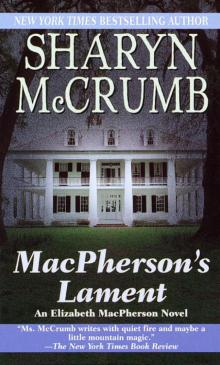 Elizabeth MacPherson 07 - MacPherson’s Lament
Elizabeth MacPherson 07 - MacPherson’s Lament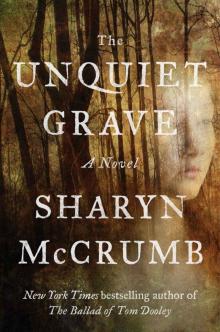 The Unquiet Grave: A Novel
The Unquiet Grave: A Novel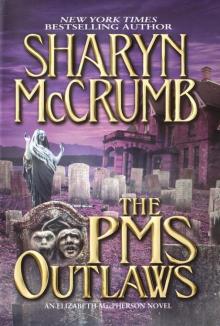 The PMS Outlaws: An Elizabeth MacPherson Novel
The PMS Outlaws: An Elizabeth MacPherson Novel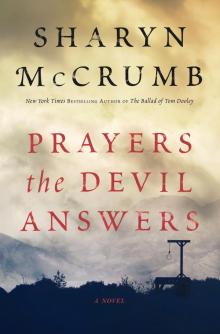 Prayers the Devil Answers
Prayers the Devil Answers Paying the Piper
Paying the Piper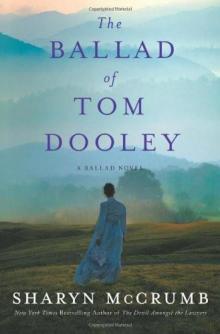 The Ballad of Tom Dooley: A Ballad Novel
The Ballad of Tom Dooley: A Ballad Novel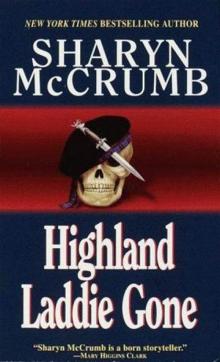 Highland Laddie Gone
Highland Laddie Gone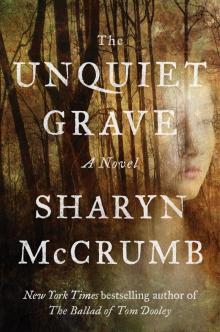 The Unquiet Grave
The Unquiet Grave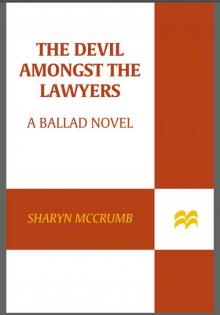 The Devil Amongst the Lawyers
The Devil Amongst the Lawyers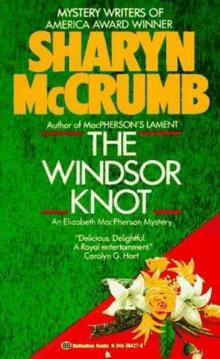 The Windsor Knot
The Windsor Knot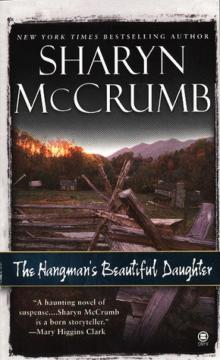 The Hangman's Beautiful Daughter
The Hangman's Beautiful Daughter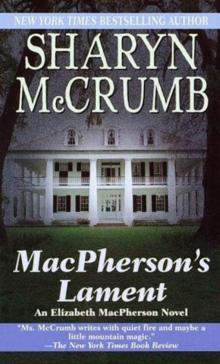 MacPherson's Lament
MacPherson's Lament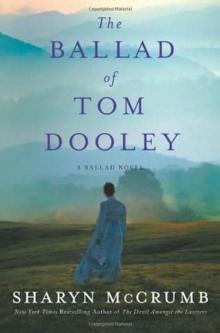 The Ballad of Tom Dooley
The Ballad of Tom Dooley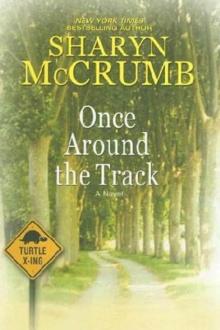 Once Around the Track
Once Around the Track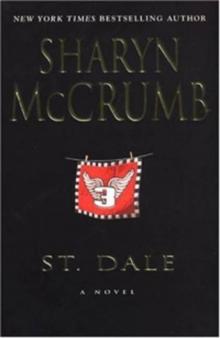 St. Dale
St. Dale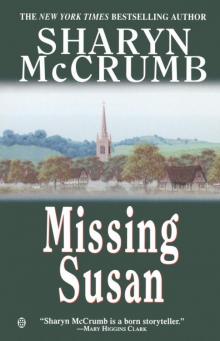 Elizabeth MacPherson 06 - Missing Susan
Elizabeth MacPherson 06 - Missing Susan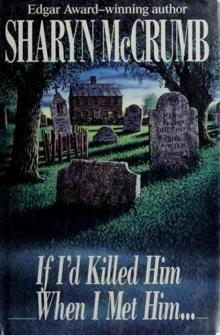 If I'd Killed Him When I Met Him…
If I'd Killed Him When I Met Him…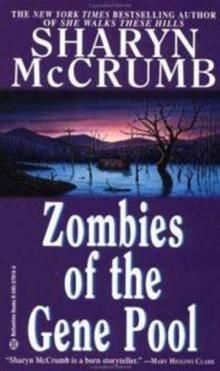 Zombies of the Gene Pool
Zombies of the Gene Pool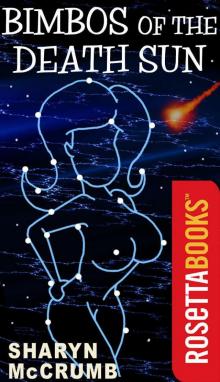 Bimbos of the Death Sun
Bimbos of the Death Sun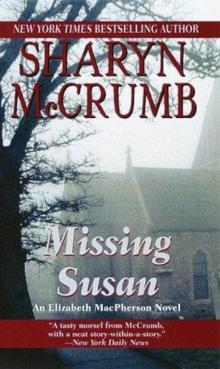 Missing Susan
Missing Susan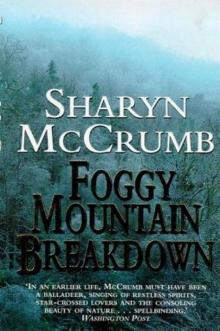 Foggy Mountain Breakdown and Other Stories
Foggy Mountain Breakdown and Other Stories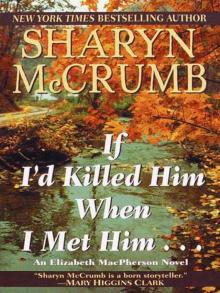 If I'd Killed Him When I Met Him
If I'd Killed Him When I Met Him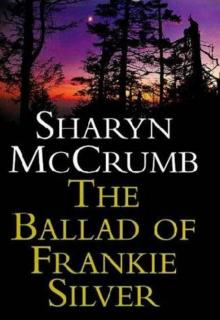 The Ballad of Frankie Silver
The Ballad of Frankie Silver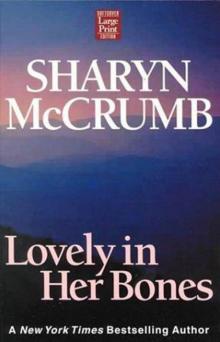 Lovely In Her Bones
Lovely In Her Bones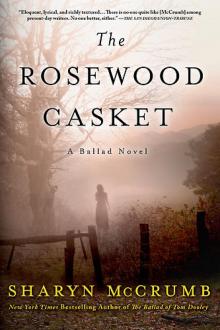 The Rosewood Casket
The Rosewood Casket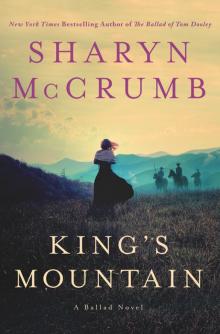 King's Mountain
King's Mountain